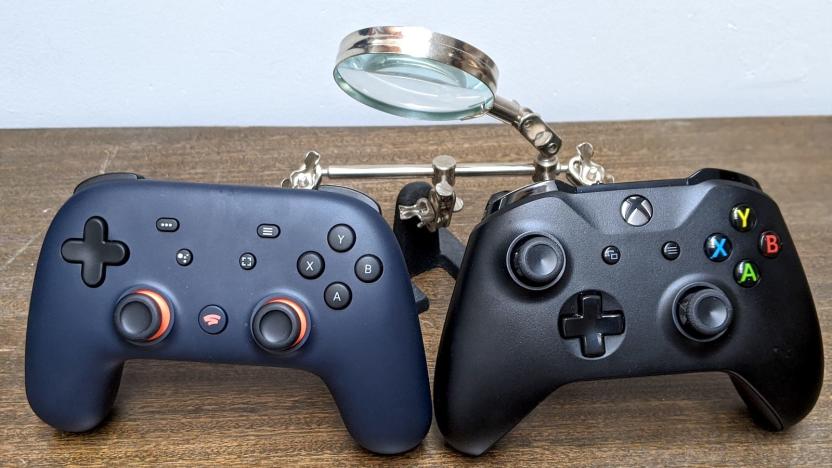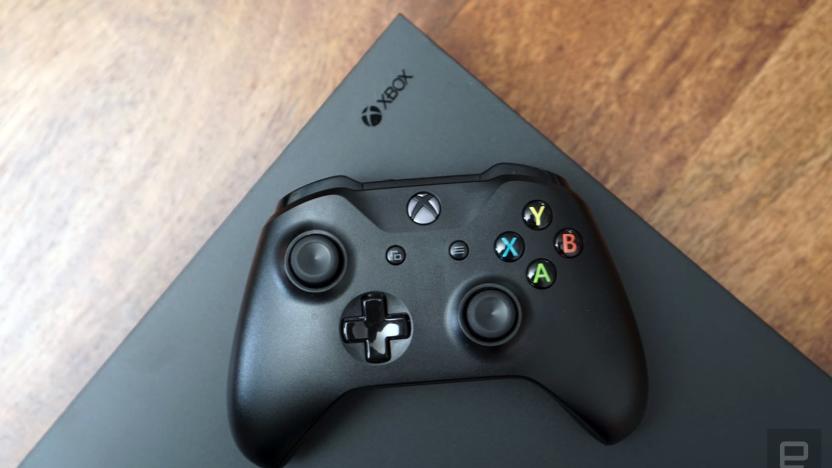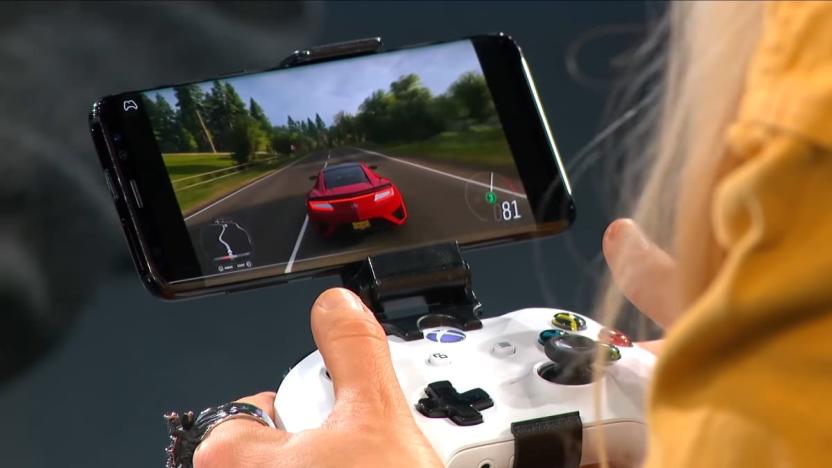cloud gaming
Latest

Google Stadia's Assistant button starts working in 'early access'
When Google unveiled Stadia, its cloud-based streaming games platform, it showed off a button on the controller that linked directly to its Google Assistant AI helper. The idea is that players will be able to easily pull up tips and relevant information without even losing their game, however it wasn't quite ready for the service's playable-but-fragile launch last month. In a community update the company confirmed that it has rolled out "some Google Assistant functionality for your Stadia Controller." On Twitter, @StadiaDaily and @theStadiaCrowd confirmed that the feature works for players who are using it via a Chromecast Ultra. However, at the moment it only works on the Stadia home screen and isn't usable in-game. On Reddit Google said that right now players can use it to launch games, and the videos posted show players using Assistant pretty much as normal to answer questions. Eventually Google Assistant may bring some exclusive experiences to gaming in the cloud, but right now it's less functional than the Xbox One integration that can turn the system on and off, launch games and take screenshots.

Stadia vs. xCloud: How these game-streaming services stack up
Cloud gaming has finally arrived in a playable, frustration-free form (mostly, anyway), courtesy of two tech giants with the network infrastructures to actually make streaming happen: Google and Microsoft. However, both companies are diving into this all-digital, subscription-based market from different angles. Stadia officially landed on November 19th, and it's fair to say that Google overpromised and underdelivered on an ambitious launch that costs gamers $130 just to get in the door. Meanwhile, Microsoft is rolling out xCloud for free as a preview, asking for feedback and adding features as it goes. Now that both of these streaming services are playable in the wild, it's time for a good old-fashioned showdown. Considering one service has launched and already disappointed its supporters, and the other is in beta and delivering on its claims, you can probably guess which one comes out looking better here.

'Gylt' hands-on: Stadia's first exclusive game is simply spooky
The developers at Tequila Works get bored easily. At least, that's how it seems after scrolling through a list of games the independent Spanish studio has released since 2012. It starts with Deadlight, a dark, side-scrolling action title set in a lonely zombie apocalypse. After that, Tequila Works released a murder mystery set inside a trippy mansion casino, a heartwarming platformer about a long-lost civilization, a narrative-driven VR title, a world-building app for iOS, and the official VR project for Sony Pictures' Groundhog Day.

Google Stadia hands-on: Shockingly playable
I barely expected Stadia to work. Stadia is Google's attempt to make cloud gaming happen, and the company has promised a lot: the ability to play basically any game at up to 4K on your TV, phone, tablet or laptop, with no lag and on existing internet infrastructure. And, based on these broad qualifiers, Stadia delivers.

Google wants to reduce Stadia lag with 'negative latency'
Plenty of gamers are skeptical about cloud-based gaming. Fast internet connections just aren't prevalent enough, the argument goes, and lag will kill the gameplay experience. Google is diving in head first with Stadia, though. In an interview with Edge, Stadia's VP of Engineering Madj Bakar said the platform will eventually be more responsive than consoles. And while the technology to do so sounds silly, the underlying concepts may prove to be effective.

Id Software built a framework to make streaming video games better
Bethesda is jumping on the cloud-gaming train with Orion, a software collection that optimizes game engines for streaming. Essentially, Orion is designed to make games run better on platforms like Google's Stadia or Microsoft's xCloud. It works with any game and any platform, lowering latency by up to 20 percent per frame and reducing bandwidth demands by as much as 40 percent.

Xbox's biggest competitor isn't PlayStation
Stop me if you've heard this one before. At E3 2013, Microsoft tripped over its shoelaces as it tried to justify the unexpectedly high price and complex ecosystem of its upcoming console, the Xbox One. It required an internet connection and locked purchases to specific accounts, disrupting established resale and game-sharing processes. On top of that, executives were repeatedly dismissive of fans' concerns. When Phil Spencer, then the head of Microsoft Studios, announced a $500 price tag for the Xbox One, the E3 audience gasped and fell silent. Hours later, Sony took the stage. Executives presented their new console, the PlayStation 4, as the balm to Xbox's burn. It didn't need an internet connection to function, used games would play just fine, and titles wouldn't be tied to online accounts, making sharing easy with physical discs. PlayStation boss Jack Tretton announced the PS4's price of $400 and cheers exploded throughout the stadium.

Console gaming is at a crossroads
Sony and Microsoft have been walking the same path for nearly 20 years, when it comes to gaming hardware. Instead of leaves, shiny silver game discs dangle from the trees, while black and white boxes of varying sizes line the underbrush, covered in decades of debris and Doritos dust. Both companies know this trail well -- but it's about to split in two.

Google is convinced it can get game streaming right
Phil Harrison won't budge. As a vice president and general manager at Google, he's spent the past 15 minutes explaining why Stadia, the company's freshly announced game-streaming service, will actually work on the existing internet infrastructure across North America and Europe. He's focused on the investments Google has made over the past 20 years in cloud networks, talking up the company's 7,500 server nodes, custom CPUs and partnerships with major internet service providers.

Microsoft reminds everyone about Project xCloud with a live demo
There are so many competing attempts to become the Netflix of Gaming -- in more than one form -- it can be hard to remember who is in the mix. Sony just recently reminded everyone of PS4 Remote Play with a new app for iPhones and iPads, and we're already anticipating a big announcement from Google next week. Microsoft doesn't have much new information to share about its own game streaming platform, Project xCloud, but exec Kareem Choudhry did give viewers a live demonstration of the technology during an Inside Xbox broadcast. In an accompanying blog post he confirmed it's still on track to begin real-world tests later this year, and carefully pitched it as an addition to traditional console gaming -- which is still going to be a source for 4K and HDR experiences -- while this can be an option for use on the road or while someone else is watching TV.

Sony expands PlayStation Now to seven more European countries
Sony is bringing PlayStation Now to more countries across Europe. As of today, players in Italy, Spain, Portugal, Finland, Sweden, Denmark and Norway have full access to the game streaming service. A public beta opened in those nations last month.

Square Enix unveils cloud gaming business Shinra Technologies
Square Enix announced its aim to deliver "revolutionary" cloud-based gaming with Shinra Technologies, a newly launched subsidiary helmed by Yoichi Wada, the former president of the Japanese publisher. Cutely named after the company in Final Fantasy 7, Shinra's goal is to "change the game industry ecosystem by offering new types of games experiences" through its own tech. Shinra appears to be an evolution of Square Enix's Project Flare streaming project (the service's web page now redirects to Shinra's) but set up as a separate subsidiary. Shinra wants to deliver cloud gaming using what it calls a "virtual supercomputer." Rather than using one central processing unit (CPU) and one graphics processing unit (GPU) to stream a game, Shinra said its tech pools "hundreds or thousands of CPUs and GPUs in a datacenter" to boost processing power and deliver higher quality games. "It's like having a super-powered games console," Shinra's FAQ claims, "with no need to buy the console."

Reuters: Comcast, EA working on a deal for Madden, FIFA and PvZ on cable boxes
Despite our long wait for a next-gen Sega Channel, the rise of gaming on new platforms and recent push of cloud gaming services, our cable and satellite TV boxes mostly stick to just video. That could change soon, according to a report by Reuters that Comcast and EA are close to a deal (as Re/code points out, Multichannel News revealed an "Xfinity Games powered by Origin" test late last year). According to the paper, that could put games like FIFA, Madden, Monopoly and Plants vs. Zombies on sale via the new X1 platform Comcast is rolling out across the country. Probably not coincidentally, this post-Cable Show rumor also arrives just as Comcast is pushing to get its merger with Time Warner Cable approved. This would put the company's boxes in competition with Xbox and PlayStation (which has its own cloud gaming service in testing), gaming-ready set-top boxes from Amazon and Roku, and even rumored setups from the likes of Google and Apple.

OnLive cuts price of CloudLift subscription fee nearly in half
OnLive launched CloudLift last month, a service that lets users stream its selection of games from capable machines to devices that wouldn't normally be able to play them - think tablets and underpowered computers. CloudLift used to cost $14.99 a month, but that subscription fee has been slashed to $7.95, presumably because price drops are awesome. Saints Row 4, Batman: Arkham Origins and The LEGO Movie Videogame serve as highlights among Cloudlift's offerings, all of which can be streamed from Steam if you own copies of the games there. Given that your interest in Cloudlift likely depends on whether the service stands up to your expectations, you can try a free 7-day trial by finding CloudLift in the OnLive application's Market. [Image: OnLive]

Toshiba TVs with PC games streaming from cloud coming to the US
OnLive might not be the most successful cloud-based gaming platform, but with Sony's recent reveal of the Gaikai-powered PlayStation Now, the concept is only gaining more traction. Similar to OnLive's push for integration with tablets and TVs, Toshiba's incoming line of smart TVs will also offer game streaming capabilities via cloud-based gaming service GameNow. Toshiba's press release states that the GameNow-compatible L3400U, L5400U, and L7400U smart TV models are "scheduled to begin shipping" in the first quarter of 2014. Polygon reports that the service will feature PC games published by Capcom like Devil May Cry 4 and Resident Evil 5, as well as Warner Bros. games like Batman: Arkham City. GameNow creator Ubitus has also struck deals with Square Enix, Sega and Konami involving cloud-based versions of their games overseas, such as Dragon Quest X. Polygon described the rounds of Street Fighter X Tekken it played at CES with Logitch wireless controllers as "playable, but laggy," suggesting GameNow might be serviceable for genres where split-second timing isn't everything.

Cerny on cloud gaming: Some genres perform better than others
PlayStation 4 lead architect Mark Cerny addressed the console's Gaikai-powered cloud gaming capabilities in a recent interview with IGN, explaining that certain genres may be more conducive to streamed gameplay than others due to latency. "It is just a part of that cloud gaming technology that there will be a bit of latency there," Cerny said. "Ultimately I think it's going to be that some games will work really well in that kind of context and some games will work less well. If you're playing a twitch fighter or racing game, you might not want to be doing that. That's cloud gaming. But a lot of games will work very well that way." Remote Play performance between the PlayStation 4 and a linked PlayStation Vita system should not be an issue, however. "If we're talking about Remote Play on Vita, that's done with a direct Wi-Fi link, and the latency is very low," Cerny assured. "It's all in the house. Once you get out of the house, there will be some latency." Sony previously announced that players will be able to stream cloud-stored PlayStation 3 games on PS3, PS4, and PS Vita systems starting in 2014.

Ouya CEO open to cloud gaming, Discover store on third-party hardware
Ouya Inc. has offered support for cloud gaming service OnLive from the launch of its open-ended gaming device, the Ouya. Once OnLive filed for bankruptcy, however, Ouya began talking with other vendors about supporting its platform, CEO Julie Uhrman's recent interview with VentureBeat revealed. Uhrman stated that there is "absolutely a role for cloud gaming on Ouya," but did not offer specifics as to which service the company is considering partnering with other than "all the ones that you're thinking." More curiously, Uhrman said she's also open to the idea of Ouya's Discover store appearing on third-party hardware. The hypothetical deal would work only if the partner's product offered "the exact same specifications" as future Ouya devices in order to avoid fragmentation for developers.

PlayStation cloud service launches in 2014, will stream PS3 games
Sony's new cloud service will launch in 2014, Sony Computer Entertainment president Andrew House announced during the company's E3 press briefing. The service will allow players access to a library of "critically acclaimed" PlayStation 3 games using Gaikai streaming technology. It will initially be available on PlayStation 3 and PlayStation 4, and will launch on Vita sometime later.

AMD announces Sky Graphics as part of cloud gaming strategy
AMD is making a new push into cloud gaming. The company today announced the Sky series of Radeon graphics cards, designed especially with cloud gaming in mind. The line includes three enterprise-grade cards, with the high-end Sky 900 incorporating a whopping 3,584 stream processors, 6GB of GDDR5 memory and a memory bandwidth of 480GB per second. The cards are built on AMD's Graphics Core Next architecture and use RapidFire technology, which it says allows for "highly efficient and responsive game streaming."The company is "working closely" with several cloud gaming companies to take advantage of the new line of cards, including Otoy, Ubitus, G-Cluster and CiiNow. The latter in particular was promoted heavily, with AMD noting that, paired with its new Sky cards, CiiNow is capable of delivering content to a broad range of devices including game consoles, tablets and, of course, computers. Furthermore, it claimed that CiiNow offers lower latency than competitors like Gaikai and, somehow, even lower latency than the local signal between a game console and a television.Nvidia made similar claims about its Grid cloud technology last year, at which time Ubitus and G-Cluster were also announced as partners. Awkward.

OnLive's Bruce Grove on next-gen gaming, MMOs: 'We can take the leadership here'
To say the last 12 months have been a bit of a bumpy ride for game streaming service OnLive would be a bit of an understatement. However, over that time, the games continued to stream uninterrupted, and the firm seems intent on not standing still. In a recent interview, GM Bruce Grove espoused his optimism for the technology beyond general hardware vendor collaborations. The key, Grove believes, being cloud-gaming's very design, which he hopes could always offer more power than current consoles thanks to the "rafts and rafts" of CPUs at the game developer's disposal -- without the wait for new hardware iterations. More importantly, Grove's confident in OnLive's continued stability as a company -- even after nearly self-destructing. "We now have a feeling that here we are as a company, we have a huge amount of experience with this business model, we can point to the things we have seen don't work ... we have a positive feeling that we can take the leadership here," he said. It wasn't just processing prowess and company stability he was keen to talk-up; cross-platform MMOs got a mention too. Grove essentially claims that OnLive's "cracked" the problem of delivering the multiplayer format to mobile -- and other non-traditional platforms -- but implies that there are still some tangles when it comes to making the model work for his firm's particular set-up. The flexibility of cloud-based gaming has always been the central pin of its proponents' arguments, but with the boast that his firm could take the lead in this area, Grove is hinting at the direction OnLive is focusing on. We'd also point out that MMOs aren't typically the most stable of sectors in the game industry -- outside of Blizzard juggernaut World of Warcraft, few are competitive if at all successful -- and playing one through OnLive would mean paying both for an OnLive subscription and a game subscription. Grove hopes to get around that issue with an OnLive -exclusive MMO; something he's "fairly certain" will happen, but we're less sure about. Still, we've yet to hear much in the way of concrete details regarding OnLive's plans since the company imploded last summer, so we'll have to wait and see what the company's cooking up for 2013. Head through the source to Red Bull UK's full interview for even more.








